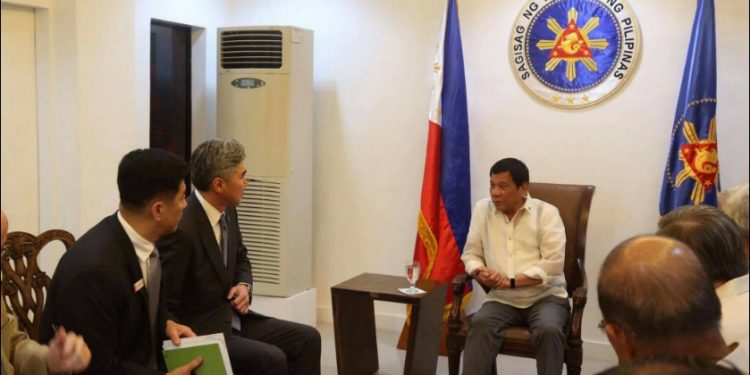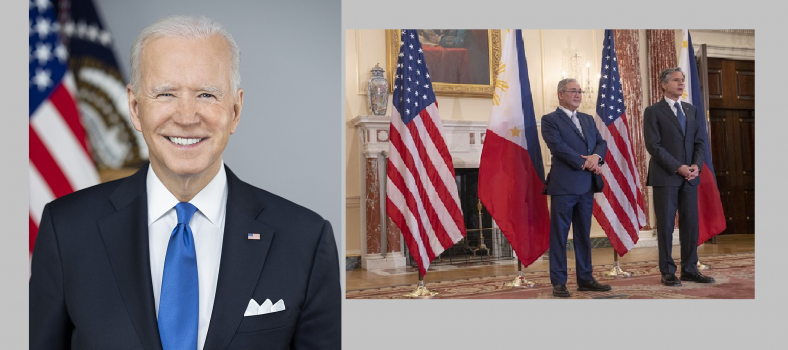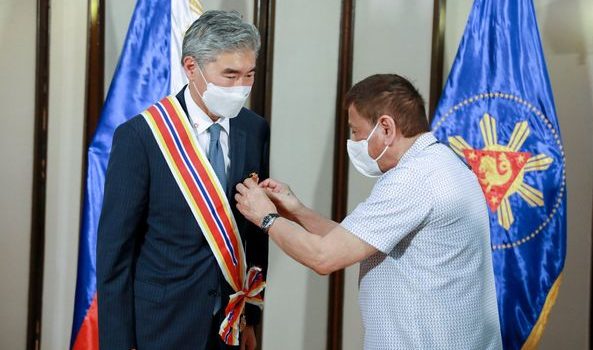US Ambassador Sung Y. Kim: speaking at the Romulo Cafe

FILIPINO WORLDVIEW by Roberto R. Romulo (The Philippine Star)
February 3, 2017
I recently hosted a dinner in honor of the new American Ambassador Sung Y. Kim. By design, it turned out to be not just a social affair but an opportunity for the ambassador to interact with the business community who were also eager to find out what to expect under a Trump Presidency.
As commented by one of the guests: “The participation was top-notch, and I thought the discussion was very good.” I was gratified that there was indeed a good turnout from the private sector represented by businessmen, senior former government officials, media and those involved in overseas investments including China.
On the day before the dinner, I informed most guests that the new Ambassador would be pleased to learn more about the views of Filipinos on the United States and on the burning issues of the day. I cited that Chatham House Rules would apply meaning information discussed can be used but not for attribution.
It worked although it required a little prodding from me to get my not usually shy guests to open up. Eventually, I thought I succeeded in making my guests speak up on what I thought were quite substantive and topical issues.
The state of Philippine-US relations particularly in the context of the shadow of China looming large in the region generated the most conversation. Will the US fulfill its obligation under the Mutual Defense Treaty (MDT) should the Philippines come under threat? Will the Enhanced Defense Cooperation Agreement (EDCA) add to the capability of the Parties to carry out the provisions of the MDT by providing access to the prepositioning of defense material in the Philippines? It will be recalled that EDCA has two major provisions: 1) the prepositioning of defense material; and 2) the establishment of a depot for disaster relief goods and equipment. The second clearly benefits the Philippines as it gives effective first responder capability in case of natural disasters. The first is little understood and only came to light publicly early this week when President Duterte expressed his displeasure at the alleged storage of war materials under EDCA, an assertion which both the USand the Philippine military subsequently denied as true.
Clarification was also sought on the Trump administration’s tough talk against China including barring its access to the islands in the South China Sea it presently occupies and its strong statement of support for Taiwan in a seeming departure from the US long-standing “One-China Policy.” Basically, the guests wanted to know whether these are going to be eventually translated into policy and actions and is the US prepared to deal with the response?
President Trump’s economic policy – in particular on global trade – also drew a number of questions seeking clarity. The swift retreat from trade and investment liberalization and globalization towards protectionism and insularity, has been particularly alarming.
On BPO, for example, given the substantial proportion of GDP tied to this industry, the majority of which is accounted for by the US market, there is a heightened concern over recent pronouncement of the US administration of disincentivizing and indeed penalizing the outsourcing of manufacturing and services. How has the US perspective on services and particularly those sourced from the Philippines changed? Will the withdrawal from the Trans-Pacific Partnership (TPP) and renegotiation of NAFTA announced by President Trump just a few days after taking office, mean the days of groups of countries deciding to open their markets in concert to achieve closer integration – best exemplified in the WTO and APEC – are over and from now on, will bilateral deal-making now be the norm? Will small economies – like the Philippines – now be forced into lopsided agreements? And is the US now going to cede global economic leadership to China, which has taken the mantle of globalization as President Xi Jin-Ping announced at the recently held World Economic Forum in Davos?
I am not sure that this level of candid conversation would have been possible in a conference/seminar setting. My personal assessment overall is that this approach makes the event more meaningful for both speaker and audience. I think Ambassador Kim and his audience both had good take away from this dialogue. My brother Dick and I believe that this would be an excellent format for future events sponsored by the Carlos P. Romulo Foundation.
I obviously will not quote the Ambassador under the Chatham House rules. Let me just say that he did well as is expected of a seasoned senior diplomat. Those are tough questions the answers of which are going to come from a suddenly unpredictable and contrarian Washington.
I offered that many of us are left unsure and bewildered about our current Administration’s pronouncements and judging from what is happening in the US, so many Americans are feeling the same it seems. It is tough on diplomats who have to present in the best light possible what emanates from the capital.
In both instances, the appropriate response would seem to be that it is early days and these statements and pronouncements will appropriately be judged when the rubber meets the road, i.e. they become policies and are implemented.
Personally, I was impressed by his calm demeanor (probably developed from dealing with the likes of Kim Jong-Il) and I am confident he will be an earnest advocate of the Philippine cause in Washington even as he presents his own country’s views and pursues its national interest. In sum, my friend Tom Hubbard was right strongly endorsing him.




